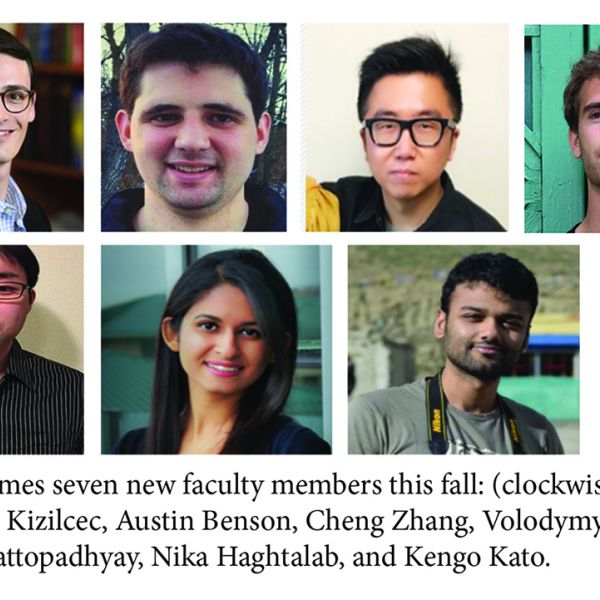Cornell Computing and Information Science is excited to have seven new faculty join its ranks. “Considering the degree of competition for outstanding faculty in tech fields, we are delighted to welcome these new faculty members who will expand our teaching and research capabilities as our enrollments continue to soar,” said CIS Dean Greg Morrisett. Hired in 2017-18 but joining CIS for the first time this fall are Assistant Professor Austin Benson and Eshan Chattopadhyay in Computer Science and Assistant Professor Rene Kizilcec in Information Science. New faculty are Nika Haghtalab (CS), Kengo Kato (Stats), Cheng Zhang (IS), and Volodymr Kuleshov (Jacobs Technion at Cornell Tech).
Computer Science Department:
Nika Haghtalab will join Cornell Computer Science as an Assistant Professor in Fall 2019 after completing a postdoc at Microsoft New England. Haghtalab’s research focuses on the theoretical aspects of machine learning and economics. She recently interned at Microsoft Research in NYC and in Redmond and is the recipient of a Microsoft Research PhD Fellowship, an IBM PhD Fellowship and a Siebel Scholarship. She received her PhD in computer science from Carnegie Mellon.
Austin Benson will join Cornell Computer Science as an Assistant Professor after completing a postdoc at Cornell this past year. His research develops computational frameworks for analyzing large-scale and complex datasets coming from the Web, social networks, biology, and other scientific domains. His paper, “Higher-order Organization of Complex Networks,” was published in Science. Benson is a PhD graduate of Stanford University and spent two summers working at Google.
Eshan Chattopadhyay will join Cornell Computer Science as an Assistant Professor after completing his postdoc at the Institute for Advanced Study in Mathematics at Princeton University. He recently spent a semester as a Microsoft Research Fellow in the Pseudo-randomness program. His research interests are in complexity theory, pseudorandomness and cryptography. He received his PhD in computer science from the University of Texas-Austin.
Volodymyr Kuleshov will join the Jacobs Technion-Cornell Institute at Cornell Tech as an Assistant Professor. His research focuses on machine learning and its applications in genomics and personalized medicine including developing a machine reading system for scientific literature that will help make biomedical knowledge easily accessible to scientists and clinicians. Kuleshov received his PhD from Stanford University and has had numerous research papers published in machine learning and genomics publications.
Statistics Department:
Kengo Kato will join Cornell Statistics as an Associate Professor. Most recently a member of the Faculty of Economics at The University of Tokyo, Kato’s research fields are mathematical statistics, econometrics, and economic statistics with a focus on high dimensional statistical and econometric models. He was a visiting scholar in the Department of Economics at MIT and is the associate editor of the Japanese Economic Reviewand the Journal of Statistical Planning and Inference.
Information Science Department:
René Kizilcec will join Information Science as an Assistant Professor after serving as the Director of Digital Learning Research and the Lytics Lab at Stanford University, where he received his PhD. His research is on social and cultural psychological factors in interactive technologies and his work has been published in leading journals such as Science, Proceedings of the National Academy of Sciences, and Computers & Education. His research has been awarded an ACM Best Paper Award and a Computational Social Science Fellowship.
Cheng Zhang joins our Information Science Department as an Assistant Professor after receiving his PhD in computer science at Ubicomp Lab at the Georgia Institute of Technology. His research examines how to solicit information around the human body to address real-world challenges in various application areas like health sensing and activity recognition. He has over a dozen publications in top-tier conferences and journals in the field of Human-Computer Interaction and Ubiquitous Computing.



